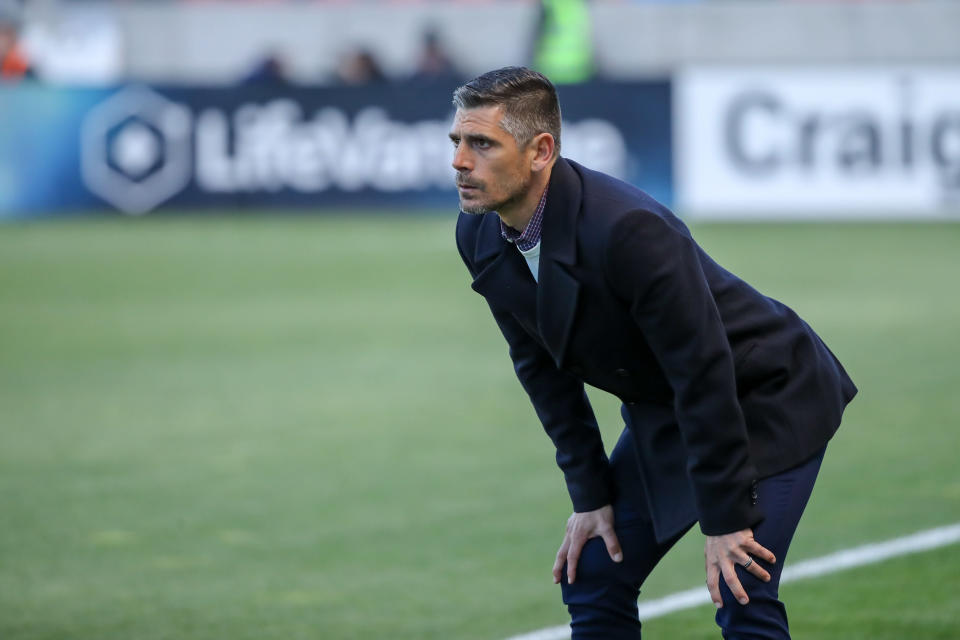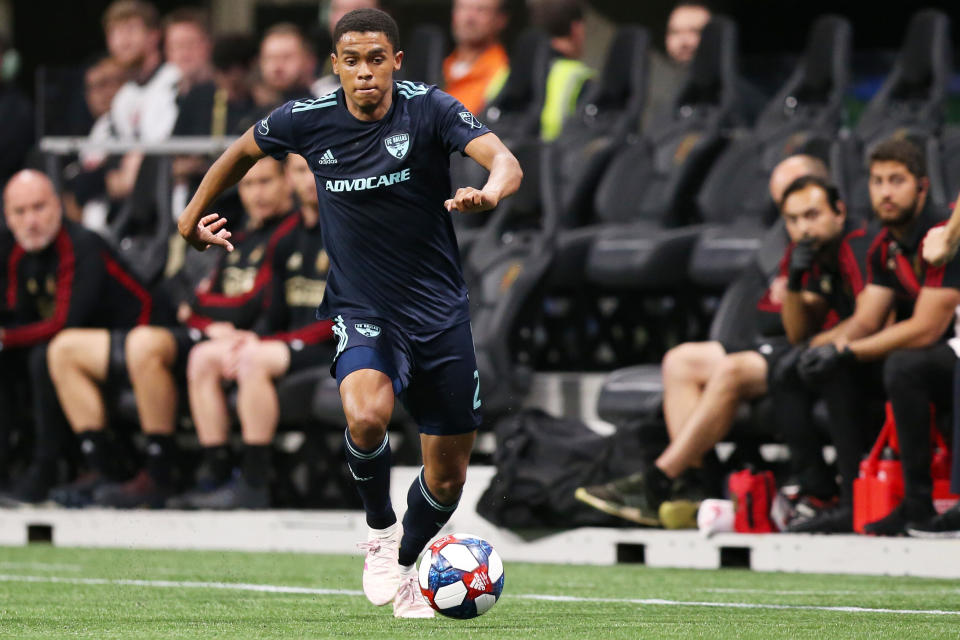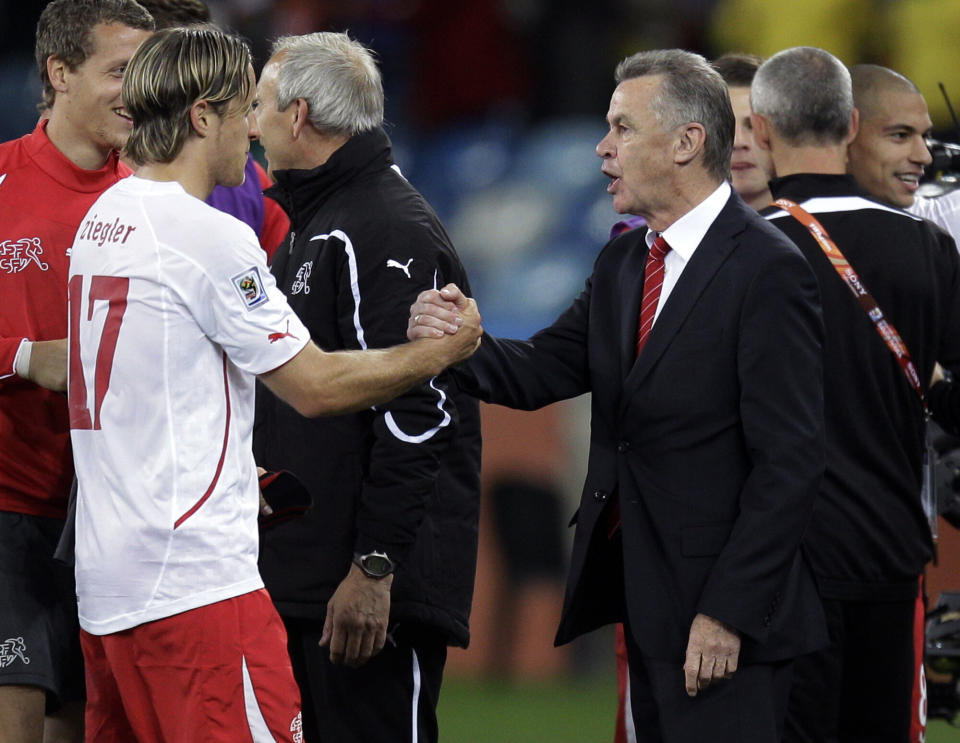24 Thoughts: The FC Dallas pipeline, Jonathan dos Santos, U.S. U-20 World Cup roster

Doug McIntyre’s weekly MLS column, 24 Thoughts, parses through the latest insights and inside info from around American soccer.
It’s appropriate that FC Dallas leads this week’s column following the club’s big win in Atlanta last weekend. The 2-1 victory on the road against the defending MLS Cup champs was seen a statement-maker by most neutral observers, proof that FCD will be a team to take seriously under first year coach Luchi Gonzalez, the longtime academy director who was hired when veteran manager Oscar Pareja left for Mexican club Tijuana after last season. It improved Dallas’ record to 5W-2L-1T. The club now sits fourth in the top-heavy West. Yet the players weren’t satisfied following the match.
“In the locker room we were smiling but believe me, we weren’t really happy because we couldn’t play our football the way we wanted to,” captain Reto Ziegler told Yahoo Sports on Wednesday. “We want to keep the ball.”
It says plenty about the early days of Gonzalez’s tenure that his team has so thoroughly bought in to a playing style so different from Pareja’s. Elsewhere in MLS, even less drastic change hasn’t gone as smoothly. NYCFC careened off the rails last season when Dome Torrent switched things up after replacing Patrick Vieira midseason. Frank de Boer’s stubborn insistence on sticking with his system has turned Atlanta from fearsome to also-ran almost overnight. Even in Columbus, where things stayed basically the same, the Crew have dropped two straight games at home.
24 Thoughts
1. I spoke to Gonzalez and right back Reggie Cannon last week, before the win in Atlanta. Cannon comes from a family of academics. His grandfather is a Nobel Prize winner. He articulates the difference in philosophy as well as anyone: “The mentality that we had last year was to score one goal and kind of sit back and beat teams that way, especially in the away games,” Cannon said.

“This year we’re learning to take our game to them, to take more risks play out of the back, use our keeper. As uncomfortable as it may me, we’re trying to get away from the whole mentality that Oscar instilled in us. It’s not a bad thing: Oscar’s a great coach. I will always have the utmost respect for him.
“Luchi just brings a different approach,” Cannon added. “He’s more hands on with the video, with the tactics. Luchi’s more of a tactical coach were Oscar is more of a ‘just get it done’ kind of guy. He wants to destroy the opponent tactically, not physically like Oscar would. It’s a huge difference.”
2. As seamless as the regime change seems from a distance, Gonzalez insisted that it hasn’t been. “Maybe on the outside it’s been perceived as a smooth transition but by no means is it,” he said. “It’s not been perfect — we’ve gotten a kick in the butt here and there. But we’ve been able to respond.”
3. Cannon was recruited to FCD’s academy by Gonzalez. It was a tough sell; not surprisingly, his parents wanted him to focus on school. (Cannon eventually spent a semester at UCLA before signing a homegrown contract.) “He was really persistent,” Cannon, a center back at the time, said of his future coach. “He told me I had the potential to be one of the best right backs in MLS one day. He knew what was best for me. That switch changed my life.”
4. Not all youth coaches find success when they move up to leading grown men. Giving him the reigns was a bold choice by the Hunt Family, FC Dallas’ owners. Gonzalez got the job over several qualified candidates including UEFA Champions League veteran Raphael Wicky, multiple sources told Yahoo. U.S. under-20 manager Tab Ramos and current U.S. senior team assistant coach were also considered. Wicky was named U.S. U-17 manager last month. But even the players who worked with Gonzalez in the academy didn’t know how Gonzalez would adapt.
“We had our concerns,” admitted Cannon. “Going from the academy to the first team is a big step for a coach, too, but I think he’s transitioned well. Luchi’s always had his mentality and his style and he’s really trying to instill that with the first team.”
5. Gonzalez’s backstory is as interesting as Cannon’s. Along with MLS stops in San Jose and Colorado, the former journeyman forward spent time with teams in Sweden and Peru. He was teaching high school algebra in his native Florida when FCD tabbed him to head up its youth development. Then-Hoops coach Schellas Hyndman, whom Gonzalez won a Hermann Trophy as college soccer’s top player under at Southern Methodist University, sold the Hunts on his unique background, as did then-technical director Fernando Clavijo. Seven years later, Gonzalez joined his mentors in becoming an MLS boss. “Certainly it’s been an adjustment,” he said of the promotion. “But I like to say there’s more similarities than differences.”
6. Pareja forged a well-earned reputation for putting youngsters on the field. Development is in FCD’s DNA. Continuity was part of the reason Gonzalez was hired. Yet somehow, the new man has been able to squeeze even more out of the club’s academy pipeline. Teenagers Jesus Ferreira and Paxton Pomykal have emerged as starters this season after barely playing during their early years with the first team. Edwin Cerrillo, who signed a homegrown deal a few weeks before this season began, has also become a regular in 2019.
7. All three have earned their spots. Ferreira — the son of former FCD forward and 2010 MLS MVP David Ferreira — has three goals in his last four games. Fellow 18-year-old Cerrillo has started five straight, picked up his first assist in Atlanta, and is now pushing for a spot on the U.S. U-20 World Cup team. And prized two-way playmaker Pomykal, 19, has scored twice and gone the full 90 minutes in six of Dallas’ eight matches. When the U-20 World Cup in Poland kicks off next month, the U.S. will likely go as far as Pomykal takes them.
8. “I don’t see some big difference in him this year technically or tactically,” Ziegler said of Pomykal’s breakthrough. “I think Paxton is a player who needs the confidence of the coach, and he has that with Luchi. He can play the way he wants to play.” As for Ferreira? “Last season he didn’t get many chances to play but I could see in training he’s really fast,” Ziegler said. “He’s learning to play back-to-the-goal right now, which maybe is new for him but he’s doing a great job.”

9. Ziegler is an outlier on a young team. The 33-year-old left back went to two World Cups with Switzerland and has spent time in the Premier League, Bundesliga and Serie A, as well as with top-flight clubs in Turkey, Russia and his native country. At 18, he was a starter with Tottenham Hotspur, where he constantly picked the brains of older teammates like Freddy Kanoute and future LA Galaxy star Robbie Keane. Now he’s being leaned on as the experienced guy.
9. During his time with Spurs, Ziegler played for French manager Jacques Santini, then later Martin Jol. He’s worked with other old-school European coaches such as Walter Mazzarri (at Sampdoria) and Ottmar Hitzfeld (with the Swiss national team). Is it fair to say the 38-year-old Gonzalez is more approachable than some of his old bosses? “Yes, I think communication between players and coaches is easier [nowadays],” Ziegler said. “I’m used to both, but as a young group I think it’s important to communicate a lot. Luchi does that.”
10. Ferreira participated in January camp with the U.S. U-20s, and would’ve liked to represent the United States at the U-20 World Cup. But he told Goal’s Jon Arnold last month that he didn’t believe his American citizenship application would be approved in time.
11. That’s too bad. The native Colombian has developed an almost telepathic understanding with Pomykal this season. It makes one wonder: When was the last time two American (or in Ferreira’s case, soon-to-be American) teenage attackers were not just starting, but producing, for the same MLS side? You might have to go back to Bob Bradley’s 2003 MetroStars, which featured Eddie Gaven and Mike Magee. Either way, the narrative that domestic players can’t get opportunities to play attacking spots has been turned on its ear in Dallas.
12. Neutrals take note: FCD is fun to watch. That should help at the gate in Frisco as the season goes on. It’s no secret that FC Dallas is among a number of established MLS teams having attendance issues. Last season, they finished 20th out of 23 clubs. The funny thing is that four of the club’s top six attendances have come since its high-water mark of 16,816 in 2014.
13. Speaking of Bradley, I got a chuckle out of this recent quote from the LAFC manager: “If you go and watch a game and see two teams slugging it out and no ideas and just wrestling matches and everything else, that drives me crazy,” Bradley told The Athletic’s Paul Tenorio. “The only responsibility we have is to try to (play good soccer) every time we step onto the field.”
14. During that 2003 season, the MetroStars (now New York Red Bulls) decided it made sense to play at high noon on a weekday in mid-August. The idea was to sell tickets to summer camps. It backfired spectacularly. Not only did 5,000 fewer fans than usual show up, the temperature on the artificial turf field at Giants Stadium topped out at 118 degrees. Kansas City’s Jimmy Conrad was stretchered off with heat exhaustion and given an IV in the locker room. The game, which ended scoreless, was unwatchable.
After his postgame news conference, I pulled Bradley aside to ask a big-picture question. Basically, it was “How can people be expected to pay for this?” I’m paraphrasing, but Bradley’s response was something along the lines of “Of course we’d like to play beautiful soccer on a perfect grass field without NFL markings in an actual soccer stadium like in the European leagues we all admire, but we have a game to play and my guys are busting their asses trying to win.” MLS still has a long way to go, but things like that remind me how far it’s come.
15. First and foremost, MLS is in the entertainment business. I found it interesting that the league marketed itself before this season not on quality, but excitement. MLS claims its games produce more goals, shots and quality scoring chances than “any other top league in the world.”
It’s a wise strategy. Serie A was the best league anywhere in the early 1990s. But the games were often defensive chess matches, and the way many stadiums were built left fans seated far from the action, killing the atmosphere, at least on television. The initial rise of England’s Premier League was based on entertainment. The play then was technically unrefined, but the games were enthralling: end-to-end action with engaged supporters that were part of the spectacle.
Going by this year’s UEFA Champions League results, the Prem might have edged back in front of La Liga as the top circuit in the world for the first time in a decade. That designation changes. The Premier League’s brand as the planet’s most entertaining league never does.
16. I watched Monterrey beat Tigres Tuesday in the first leg of the all-Mexican CONCACAF Champions League final. Those teams are on a different level than any in MLS (and in most of Liga MX). But I’d love to know how last year’s Atlanta United or this year’s LAFC would fare against them.
17. Right now, Carlos Vela is the best player in MLS hands down. For my money, Zlatan Ibrahimovic is second, even at 37. Who’s third? That one’s tougher to answer. There’s Wayne Rooney, who scored yet another set piece goal for D.C. United on Wednesday. There’s reigning MVP Josef Martinez. But both have struggled to reach their 2018 heights so far. Could it be LAFC’s Diego Rossi, who trails only running mate Vela and Zlatan for the Golden Boot? My vote goes to Toronto FC’s Alejandro Pozuelo, who stepped into Sebastian Giovinco’s rather large shoes and already has four goals and five assists in just four games.
18. It’s crazy how Allianz Field instantly changed how Minnesota United is perceived. The Loons were hard to watch during their two seasons at the University of Minnesota. Now their games feel like can’t-miss affairs.
19. Minnesota held Ibrahimovic and the Galaxy scoreless on Wednesday night, but LA’s strong start under Guillermo Barros Schelotto continues. A large part of the early success has been down to the midfield trio of Sebastian Lletget, Jonathan dos Santos and Joe Corona.

20. Dos Santos, in particular, has been a lynchpin. The 28-year-old Mexican national team standout could’ve sulked when his brother, Giovani, was bought out of his designated player contract by new general manager Dennis te Klose on the eve of the season. He’s been a consummate professional instead, and is enjoying his best form since joining the Galaxy from Spanish club Villarreal in 2017.
21. Dos Santos began his career with Barcelona. So did 17-year-old Galaxy defender Julian Araujo, who spent time in FCB’s residential academy in Arizona and impressed the club’s scouts on a trial at La Masia. Only the lack of a European Union passport prevented the club from signing him. On Wednesday, Araujo made his second career start, turning heads at right back before leaving in the second half because of injury.
Julian Araujo vs Minnesota United
LA Galaxy’s 17-year-old gem. pic.twitter.com/8G546jEiO7— USMNT Videos (@USMNTvideos) April 25, 2019
22. It looked bad; Araujo had to be carried off the field. But Schelotto said afterward that he’s hopeful the youngster can make it back for the Galaxy’s next match, on Saturday against Real Salt Lake. That would be good news for Ramos; Araujo, who is also eligible to represent Mexico internationally, is expected to be on the U.S. U-20 World Cup squad when rosters are submitted to FIFA next week.
23. Despite his tender age, Araujo is also a member of the U.S. U-23s. Word is that U-23 coach Jason Kreis, who later this year will attempt to qualify the Americans for their first Olympic football tournament since 2008, will pull heavily from these stacked U-20s. I’m told Kreis will be in Poland to personally scout Ramos’ team.
24. What does it say about the New England Revolution that the Montreal Impact could land in Boston a few hours before kickoff at Foxborough because of travel issues and still trounce the Revs 3-0? Also: unlimited charter flights can’t come to MLS soon enough.
More from Yahoo Sports:

 Yahoo Sports
Yahoo Sports 
